Cute zoo babies! The world’s best library! And lots more reasons we’re lucky to live here. Click through the numbers at the bottom of each page to see a new reason—and make sure to leave the reasons you love Washington in the comments.
Reason 1: You Can See the Sky
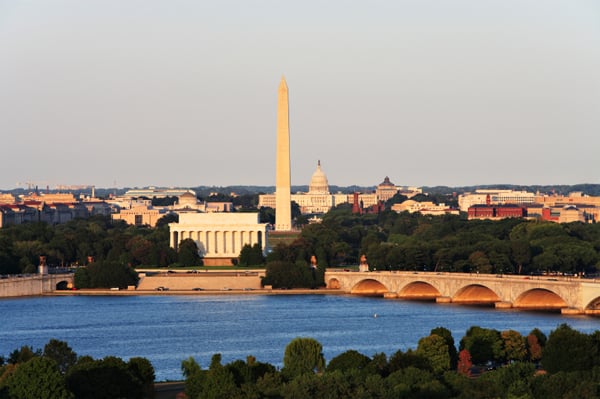
>>Another reason to love Washington? Our new neighbor is hot!
Reason 2: The Obamas Are Our Neighbors
The new First Family is getting out and making its presence felt
During eight years of an early-to-bed White House, it was easy to forget that the First Family lived here. George W. Bush rarely ventured into the city or entertained guests—his trip to Cactus Cantina in 2003 was an exception, and he hosted just one white-tie state dinner. The only reliable First Family sightings in those days were of Jenna and Barbara Bush at bars and restaurants.
The new First Family is much more accessible. You don’t have to pull strings to sleep in the Lincoln Bedroom. To sleep where the Obamas once slept, all it’ll take is a call to the front desk at the Hay-Adams. For several grand a night, you can stay in the same presidential suite that housed the Obama family before they moved across Lafayette Park, enjoy the same Italian linens and down comforters. That TV remote? The President probably used it to watch SportsCenter.
As a nation, we have lots of interest in the new First Family. All Barack needs to do is mention a book he’s interested in and it rockets up the bestseller list. Michelle’s muscular arms provide cocktail-party fodder for a week. J. Crew can’t keep up with the demand for outfits worn by daughters Sasha and Malia.
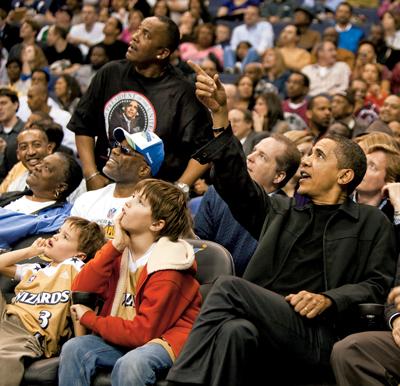
We identify with the Obamas—they seem like a regular (extremely good-looking) family. In addition to POTUS and FLOTUS, the press corps has to track the FGOTUS, the First Granny of the United States, 71-year-old Marian Robinson, who also resides in the White House. Even the girls have an endearing nonchalance. Riding Marine One for the first time, Sasha was more concerned with the onboard candy than with the view of the Washington Monument. “Are those Starburst?” she exclaimed.
And with Washington swirling with more acronyms than ever, it’s reassuring to have a President who takes time away from NATO and TARP to shake his head at the underperformance of the ACC as it ruins his NCAA bracket.
Sometimes it’s easy to focus on the negatives of the First Presence—our commutes get interrupted by his motorcades, and we suffer through long lines for magnetometers at Nationals Park when the President goes to a ball game. Yet we’re lucky to have peripheral access to the world’s biggest celebrity. Remember the look of wonder on your visiting relatives’ faces when those iconic limos flew by?
Living in Washington is never boring—and with a First Family that seems set on making its neighborly presence felt here, we’re in for lots of sightings.
There’s Michelle serving a meal at Miriam’s Kitchen, the President and First Lady enjoying the Alvin Ailey dance troupe at the Kennedy Center, Sasha and Malia and their mom at the Gallery Place movie theaters. That duo of armored Suburbans that passed you on Wisconsin Avenue? Barack and Michelle on their way to parent/teacher conferences at Sidwell Friends. This is, after all, a President who puts his kids’ spring break above such old-school traditions as the Gridiron dinner.
Presidents help make Washington a world-class city and define what’s hot. Time to celebrate a birthday? Take a cue from Michelle and head to Equinox, where the Obamas celebrated her birthday with friends including Valerie Jarrett. Want a piece of Americana Washington style? Grab a half-smoke and a sweet tea at Ben’s Chili Bowl, just as Barack did when he dropped by before his inauguration.
Want music? With the first few weeks of the administration seeing White House concerts by Stevie Wonder and Earth, Wind & Fire, it’s possible that Washington’s hottest concert venue will be the East Room. Tickets may be hard to come by, but at least there’s no Ticketmaster fee.
—Garrett M. Graff
>> Next: Reason 3 to Love Living in Washington: the Library of Congress.

Photograph by Carol Highsmith
Reason 3: We Have a Reader’s Paradise
At the Library of Congress, it seems everything ever published is there for you
Libraries are emptying in the Age of Google. When I walk into the vast Main Reading Room of the Library of Congress on a weekday afternoon, there are often just a couple of dozen researchers at work, outnumbered by the bronze philosophers and stucco cherubs who perch beneath the frescoed dome. Plugging in my laptop at one of the hundreds of polished mahogany desks, I might be a Renaissance pope alone in his private library.
This is perhaps the best place in the world to read, to think, and especially to write. In the dog days of a Washington summer, the building embraces you with a rush of cool air, the mingled scent of marble and old paper. Here, in the nation’s biggest public library and the world’s largest collection of books, it seems every volume ever published is at your beck and call: flaking folios of Serbo-Croatian periodicals, manuals of cavalry tactics, histories of 19th-century plumbing. When distraction beckons, I have only to tilt my head and gaze up: Plato and Gibbon look down from their pedestals, stern taskmasters recalling me to my work.
Just ask those wise old men: Surely there would be few better places to spend eternity than in this room. But other corners of the library beckon—obscure reading rooms where Whitman’s scribbled notebooks or Copernicus’s gilded first editions are just a call slip away.
One afternoon, losing my way in the newest of the library’s three buildings, I stumbled on a room I’d never seen before. It held an acre of old wooden card catalogs—the records of every copyright filed in America between the 1890s and 1970s.
Each book and movie, song and script, had its own pink card. Most of them were the original application forms filled out by the copyright holders themselves. In a drawer labeled 1898–1937: electrol-elliot, I found an unassuming slip filed on October 30, 1922, for a poem called “Waste land.” The applicant’s name and address, penned in a firm black cursive, was Thomas Stearns Eliot, c/o The Dial, 152 W. 13th St., New York, N.Y. (An anonymous clerk recorded that a fee of $1 was enclosed.)
Thirty feet away, another pink card recorded the February 1, 1943, copyrighting by Warner Bros. Pictures of 11 film reels collectively titled “Casablanca.” It nestled cheek by jowl, in the carter–casal drawer, with slips for the Carter Carburetor Corp.’s immortal volume Motor Tune-Up and Carburetor Service Instructions, 5th Ed., and for that unforgettable 1945 song “When You Are Always Cheating on Me” by Miss Violet M. Casady of 924 Livingston Avenue in St. Paul, Minnesota. “Embraceable You”? Sure, just down this aisle to the right. The Great Gatsby? Over there in the next aisle, fisk–fiuz drawer.
This place is not just a library but a kind of ark, holding creations both timeless and ephemeral. It is also, I think, the best thing Congress has ever done. Outside, the floods of politics rise and recede. But in here, on paper, the older and truer things stay high and dry, waiting to be called for, to be opened, to be read.
—Adam Goodheart
>> Next: A reason to love Washington? You can discover the world here!
Reason 4: You Can Discover the World Here
From Chinese art to British pop, here are ways to feel worldly without leaving town
Korea
At the all-female Hani Joa Day Spa (6676 Arlington Blvd., Falls Church; 703-533-3588), $120 gets you more than two hours of massage, exfoliation, body wrap, steam, and sauna. The tradeoff for the bargain price? Most treatments are done in the nude—and not in a private room.
India
If you loved the dancing in Slumdog Millionaire, catch more Bollywood at the Loehmann’s Twin Cinemas (7291 Arlington Blvd., Falls Church; 703-573-5774), which screens Indian films regularly.
Vietnam
Crisply suited men smoking in coffee shops, speakers broadcasting lilting Vietnamese pop, and more pho shops and banh mi delis than you could count make the maze of a mall called the Eden Center (Wilson Blvd. near Rt. 7, Falls Church) feel like Saigon on the Potomac.

Burma
The humble Mandalay Restaurant & Cafe (930 Bonifant St., Silver Spring; 301-585-0500) is home to our favorite cheap dessert, the $2.99 shweJi, a traditional, not-too-sweet cake made from coconut, raisins, and Cream of Wheat.
China
More than 10,000 pieces—fascinating archaeological relics, gorgeous sculptures and paintings—make up the standout collections at the Smithsonian’s Freer and Sackler Galleries (Jefferson Dr. and 12th St., SW; 1050 Independence Ave., SW; 202-633-1000).
Japan
Whether you’re relaxing by the koi pond, taking in the bonsai trees, or meandering down the cryptomeria walk, the Japanese garden at the National Arboretum (3501 New York Ave., NE; 202-245-2726) is one of the area’s most soothing spots.
Iran
At the Persian Yas Bakery and Supermarket (131 Maple Ave. W., Vienna; 703-242-4050), fill a basket with sweet Iranian lemons, freshly baked flatbread, and diamond-shaped baklava.
West Africa
If it’s Sunday and the sun is shining, head to DC’s Meridian Hill Park (16th and Euclid sts., NW), follow the beat, and you’ll come upon a drum circle of dancers, musicians, and everyday people. It makes for a joy-filled late afternoon.
Ethiopia
DC’s Chinatown might be almost gone, but Little Ethiopia—a stretch along Ninth and U streets, Northwest—is thriving. The neighborhood’s best restaurant is Etete (1924 Ninth St., NW; 202-232-7600), where you can share platters of spicy stews or take part in a traditional, incense-perfumed coffee ceremony.
Central and West Africa/African Savanna
The toddling panda gets most of the attention, but there are plenty of new arrivals at the National Zoo (3001 Connecticut Ave., NW) that’ll make you say, “Awww,” such as the six-month-old dama gazelle or the three-month old Western Lowland gorilla. The baby elephant shrew? Not so much.
England
On the second Saturday of most months, the Black Cat (1811 14th St., NW; 202-667-4490) feels more Manchester than DC. That’s when the dance party known as Mousetrap takes over, unleashing Britpop spanning from the Smiths to the Libertines.
France
Exquisitely delicate underpinnings fit to go under that Yves St. Laurent pantsuit can be found at the Paris-inspired shop Coup de Foudre Lingerie (11th and E sts., NW; 202-393-0878).
Belgium
Dig into a pot of moules frites while sampling golden triples, lambics, and blond ales at the creaky-cool, Belgian-owned Mannequin Pis (18064 Georgia Ave., Olney; 301-570-4800).
Georgia
A silent Hamlet? Rosslyn-based Synetic Theater (synetictheater.org)—run by director Paata Tsikurishvili and his choreographer wife, Irina—not only made it work; they made it soar. Now the Georgia natives turn their talents to a wordless version of A Midsummer Night’s Dream, which opens at the Kennedy Center this month.
Russia
You probably won’t score a Maria Sharapova sighting at the chandeliered Russia House (1800 Connecticut Ave., NW; 202-234-9433), but the borscht and beluga—and more than 100 kinds of vodka—are sure things.
Peru
With its crispy skin, secret blend of spices, and fiery sauce, it’s hard not to literally tear into the birds offered at many of the area’s Peruvian chicken joints. We like El Pollo Rico in Arlington (932 N. Kenmore St.; 703-522-3220) and Wheaton (2517 University Blvd.; 301-942-4419) and Pollo Brasero in Silver Spring (14336 Layhill Rd.; 301-438-2800).
Belize
You’ll get a serious workout during the barefoot, body-shaking Afro-Caribbean dance classes at Joy of Motion Dance Center’s Atlas studio (1333 H St., NE; 202-399-6763).
Uruguay
This tiny country produces some excellent up-and-coming wines, especially the steakhouse-friendly reds made from the Tannat grape. Rodman’s (5100 Wisconsin Ave., NW, 202-363-3466; 4301 Randolph Rd., Wheaton, 301-946-3100; 5148 Nicholson La., Kensington, 301-881-6253) stocks a good selection.
—Ann Limpert
>> Next: A reason to love Washington? Our "star" sightings aren't Paris Hilton.
Reason 5
“I love living where history is made—and that our star sightings are people like the Obamas and Rahm Emanuel, not Paris Hilton.”
Washingtonian reader Julia Knox, Columbia Heights
>> Next: Another reason to love Washington? Women have real choices here.
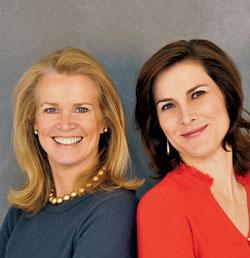
Photograph by Marissa Rauch
Reason 6: Women Have Real Choices
Washington offers professional women lots of alternatives to the traditional career path
To work in Washington is to be surrounded by big ideas and critical debate. And more than any other place in the world—except perhaps a Buddhist monastery—it draws people who are interested in something other than money and traditional measures of success.
People don’t flock here to earn big salaries but to work for things they believe in. Wealth, beauty, fashion—yes, it’s true what they say—all take a back seat to having something interesting and important to say. There is an earnestness and idealism here that’s inspiring.
For working women, that can make Washington nirvana. It’s a natural fit with our values. In our new book, Womenomics, Katty and I outline research showing that women tend to look beyond financial rewards at work—much more so than men. We want meaningful work, more time for our families, and flexibility.
In this city, opportunities abound to avoid the traditional career ladder. Tired of the law firm? Check out an NGO. Work in a Senate office. Take on projects at the Justice Department. The pay may be less, but the tradeoffs are worth it. We know hundreds of women who have crafted rich and challenging work on their own terms. And this is a culture where that choice can be appreciated and applauded. Because ideas rule, not dollars.
—Claire Shipman
I was recently on a panel speaking to a group of financial types in Germany. As I looked out at the audience of around 60, it suddenly struck me: They were all men. That would never happen in Washington.
I’ve lived all over the world, but I’ve never lived in an area where so many smart women are active in every field. The assumption in Washington is that college-educated women have careers. That’s what makes this city special.
What makes that possible and so exciting is that those careers are often fluid. Women here go in and out and backward and forward in their professional lives as they juggle the demands of families and living.
That’s been my story. In 12 years in Washington, I’ve worked full-time, part-time, and not at all, depending on the demands of my four kids. And that’s accepted, too.
When you sit at a dinner in Washington, you know the woman next to you is smart. Even if she’s now spending time raising children, you can probably bet she used to head a government agency, teach at a university, or run her own business. Who knows—in a few years when her children are older, she could be back, running the country.
—Katty Kay
Claire Shipman is senior national correspondent for Good Morning America. Katty Kay is Washington correspondent for BBC World News America. They are coauthors of Womenomics: Write Your Own Rules for Success, which will be published by HarperCollins in June.
>> Next: Another reason to love Washington? It's a great mix of the North and South.
Reason 7
“I love Washington because it’s a great mix of the North and South. You can live the city life with the suburban feel. Not to mention that within a few hours you’ve got everything—mountains, vineyards, ocean, and tons of parks.”
Sejal Chokshi, Ballston
>> Next: Another reason to love Washington? Employers want to be here.
Reason 8: Employers Want to Be Here
Companies see this region as an ideal home.
Brand-name companies are falling in love with Washington. Last year, Volkswagen abandoned the Motor City for Herndon. Hilton Hotels is giving up its Beverly Hills cachet for Tysons Corner. Even Google, king of Silicon Valley, has opened a shop in Reston.
That’s not to mention the dozen or so companies from Israel, England, China, and elsewhere planting their flags in Montgomery County.
These new arrivals see Washington as the land of milk and honey. Three airports—and increasing international flights from Dulles—make the region an ideal gateway. The area’s workers are among the most educated in the country. And increased federal contracting makes proximity to Congress and the agencies a big plus.
Quirks of the region’s demographics helped win over some transplants. Volkswagen, which also produces Audi cars, discovered that Washington has one of the country’s highest concentration of VW and Audi owners. That means its 400 or so workers will get customer feedback even at neighborhood barbecues—conversations that could prove invaluable, company officials say.
International Baccalaureate, the Switzerland-based company that produces a rigorous international K–12 curriculum, will soon pick a spot between Rockville and Chevy Chase to build one of its three global centers. The Washington area is home to 93 IB programs, which should provide a deep pool of IB-trained educators to hire from. The company also was attracted to the county’s diversity and embrace of international cultures.
“Montgomery County lives and breathes that feeling,” says the company’s Drew Deutsch.
Hilton Hotels saw advantages in Washington’s cost of living, which can look inviting to a Los Angeles–based operation. Even Washington’s traffic seems tame compared with LA backups.
The Marriott and Choice hotel empires anchor strong hospitality and real-estate industries in Washington that offer Hilton great access to business talent, company officials say.
For Chris Nassetta, Hilton’s CEO, the company’s arrival later this year will be a homecoming. He grew up in Arlington, married his high-school sweetheart, and headed Host Hotels & Resorts, a Marriott spinoff in Bethesda, before taking the Hilton helm in 2007.
—Drew Lindsay
>> Next: A reason to love Washington? The Caps are regular joes.

Photograph of Ovechkin by Mitchell Layton/Getty Images
Reason 9: The Caps Are Regular Joes
Five reasons to embrace our hottest team
These guys are fun. ESPN magazine writer Sarah Turcotte spent a few weeks with the Caps and fell in love. They’re a rarity in pro sports, she says—guys who have a good time together and work hard for the team, not for individual glory. “There’s not a sense of hierarchy,” Turcotte says. “It’s really refreshing and fun.”
They act like regular Joes. That’s partly because a lot of the players are kids with fresh memories of the low-rent lifestyle of the Hershey Bears, the Caps’ minor-league team. They mingle with fans at nightclubs and at team practices.
During the holidays, thousands turned out to watch training sessions—longtime hockey fans but also professionals on lunch break and teenage girls swooning over players. “There is no glitz, no glamour at practice,” says Joan Henderson, a 48-year-old Ashburn mother, from the stands at the Caps’ rink in Arlington. “They’re just real people working hard.”
Alex Ovechkin is a goof. Pro basketball’s biggest star, LeBron James, goes by the nickname King James. There’s no such pretense in Ovechkin, the NHL’s best player. He’s called Ovie, which captures his childlike joy on the ice. You’ll catch him sneaking glances at the Jumbotron to watch replays of his goals. His dad’s a regular at practices, and Ovechkin wears the number 8 that was his mother’s when she was an Olympic basketball star for the Soviet Union.
Ted Leonsis is not Dan Snyder. With his Kris Kringle belly and twinkling eyes, the Caps owner is welcome relief from Snyder’s scowling Napoleon. “He’s a charismatic owner who’s ensconced in the community and does a lot to give back,” says Darryl Forrest, a Caps fan.
Good times have a short shelf life. Win or lose in this year’s playoff run, the team’s appeal can’t survive indefinitely against free agency, big money, and egos run amok, Turcotte warns: “Everybody in Washington should enjoy it. These things don’t last forever.”
—Drew Lindsay
>> Next: Another reason to love Washington? Our kids speak many languages.
Reason 10: Our Kids Speak Many Languages
In the May issue of the magazine, we asked multilingual kids to tell us what they love best about living in Washington. Here are more of those interviews:
Abdujabbor Khalifaev
Age: 6.
School: Hoffman-Boston Elementary School in Arlington.
Languages: English, Russian, Tajik, and Spanish.
“Mne nraviatsia eti statui. Ja liubliu razgovarivat’ s nimi, kak Dzhordzh Vashington.”
Translation: “I like the statues. I like to talk to them, like George Washington.”
Sheyma Ben Daamech
Age: 7.
School: Lycée Rochambeau in Chevy Chase.
Languages: English, French, and Arabic.
![]()
Translation: “I like Washington because there are a lot of museums.”
Rodrigo Yepez Lopez
Age: 7.
School: Lycée Rochambeau.
Languages: Spanish, English, and French.
“Me gusta el museo del espionaje.”
Translation: “I like the Spy Museum.”
Lola Faleye
Age: 8.
School: Elsie Whitlow Stokes Community Freedom Public Charter School.
Languages: English, Spanish, and Yoruba.
“Lo que me gusta de Washington es que hay muchas cosas que ver como el monumento a Washington, el Capitolio, la Casa Blanca, y tienen buena comida. Me gusta la comida rápida como la pizza, los sandwiches.”
Translation: “The thing I like about Washington is that there are many things to see like the Washington Monument, the Capitol, the White House, and they have good food. I like fast food like pizza, sandwiches.”
Adam Workineh
Age: 10.
School: Elsie Whitlow Stokes.
Languages: English, Spanish, and Amharic.
![]()
Translation: “I like Washington because it’s where the President lives after he’s elected, and Washington is the capital of the USA, and that’s where most things about politics are.”
Maryam Hassan
Age: 11.
School: Elsie Whitlow Stokes.
Languages: English, French, and Somali.
“Mon monument préféré est le Jefferson Memorial parce qu’il y a un lac.”
Translation: “My favorite monument is the Jefferson Memorial because there’s a lake.”
>> Next: Another reason to love Washington? It's a clean city!
Reason 11
“I love Washington because it is such a clean city. For example, the Metro!”
Judy Chort, Foggy Bottom
>> Next: Another reason to love Washington? Our lives have beautiful backdrops.
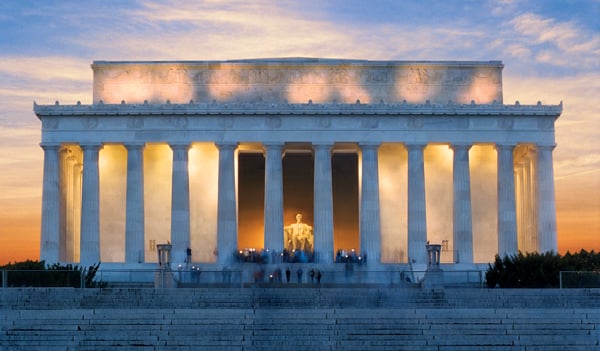
Photograph by Lester Lefkowitz/Getty Images.
Reason 12: Our Lives Have Beautiful Backdrops
We go about our days amid carved marble and places from history books
There’s a scene in the movie A Few Good Men where two characters are walking down a pretty Adams Morgan street and, if you pause it just right, you can see the first apartment my husband and I shared.
Everyone is starring in his or her own little movie, but those of us in Washington have the best montages. Our lives play out against carved marble and cherry blossoms; we walk our dogs and lug our grocery bags down streets whose past glories we’ve read about in history books. Even a traffic jam becomes less mundane when the cause is a presidential motorcade.
At my first job after college, at a K Street bookstore that has since disappeared, I looked up titles for lawyers and lobbyists, and all hell broke loose whenever a new Grisham came out. I stocked shelves and sold discount cards, for which I earned a brass name tag—which I hoped would prove prophetic—engraved with the words “Carolyn Parkhurst, Bestseller.” One December morning, I sold a pile of books to Jimmy Carter for his grandchildren’s Christmas presents.
The National Museum of Women in the Arts is where my husband and I danced on the night we were married. The post office where we’d stood and fought, two months earlier, on our way to put the invitations in the mail is steps from the hotel where John Hinckley shot President Reagan. My children play in a park behind the Vice President’s home.
Late one July evening in 1998, five days before our wedding, my fiancé and I sat on the steps of the Lincoln Memorial. We were on our way to meet my mother, whose flight would be arriving close to midnight, and we had a little time to kill. Stopping at the Mall was a spur-of-the-moment decision, but I remember it now as the happiest half hour in a very happy week. We were alone and unhurried and had a chance to remember why we were marrying each other.
The Lincoln Memorial has been the site of some remarkable scenes, and this one was no Marian Anderson, no Martin Luther King Jr.; it wasn’t even Bruce Springsteen. But there we were, and there was Lincoln, and just like that, an ordinary moment of human tenderness was elevated. Our small story became part of something larger. A giant carved in stone and two people happy to be a part of the picture, looking forward and looking back.
—Carolyn Parkhurst
>> Next: Another reason to love Washington? The tourists. Really!
Reason 13
“I love seeing the wowed expressions of all the tourists in DC. Makes me smile—yep, I live here!”
Washingtonian reader Katherine Giuffre, Silver Spring
>> Next: Another reason to love Washington? We live where others just visit.
Reason 14: We Live Where Others Just Visit
What do tourists think of our hometown? We went to the White House to find out.
Barbara Mason
Tulsa, Oklahoma
What brought you here?
Obama. I’m into him.
Having never been here before, what were your expectations?
My expectation was to see Obama or somebody in the Obama family. You don’t think the kids are getting ready to come home from school, do you?
Bruce Hvidsten with daughter Christa and son Ethan
Dallas, Texas
How does Washington compare with Dallas?
Bruce: Well, this is kind of the center of it all. Everything that seems to happen happens in DC. And no one says “y’all” here.
Would you ever live in Washington?
Christa (pointing to White House): I want to live there.
John and Tamye Moore
Silver Springs, Nevada
What brings you to Washington?
John: Firefighter’s conference. We campaign on Capitol Hill for issues for all firefighters. There’s 1,000 of us.
How does Washington compare with your hometown?
Tamye: It’s big. It’s really big here.
Sana BenNacef and Brenda O’Reilly
Mount Olive, New Jersey
What about your matching “Peace Love Obama” shirts?
Sana: Well, we’re best friends, so that’s why we’re matching. We got them at a convention.
Brenda: And we love Obama.
Is there anything that surprises you about Washington?
Sana: I’m surprised that people protest right in front of the White House. That’s really cool, actually. I hope Barack Obama sees that.
Brenda: I know. I hope he’s looking out his window.
>> Next: A reason to love Washington? The Attention to detail in the city.
Reason 15
“I love the cute houses, the blossoms, the cleanliness, the gentle pace, the attention to detail in this city, and smiling at people as you walk down the street.”
Olivia Klonaris, Chevy Chase DC
>> Next: Reason 15 to Love Living in Washington: We have experts in everything.
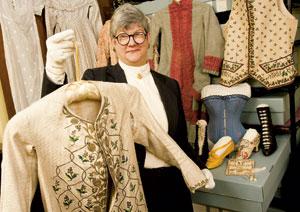
Reason 16: We Have Experts in Everything
Whether it’s costumes, blizzards, or black holes, odds are someone here studies it
Among the nation’s big metropolitan areas, Washington is the egghead. We have a third of the country’s astronomers, a tenth of its physicists, and the most PhDs per capita. Such brainpower means the region has lots of experts. Here are a few who are stars in their fields but little known locally.
Carol Mattusch, George Mason University professor and expert on Greek bronze statues. As a PhD student, Mattusch went on digs in Greece where, sifting dirt and rat droppings, she found fragments of molds used to make bronze statues. “I realized that this could take me someplace,” she says. Mattusch lectures across the country on the Greeks’ bronze-casting techniques and recently curated the popular exhibit “Pompeii and the Roman Villa: Art and Culture Around the Bay of Naples” at the National Gallery of Art.
Kim Weaver, renowned x-ray astronomer at NASA’s Goddard Space Flight Center. In the 1960s, rockets began taking satellite telescopes into Earth’s orbit to collect light that the human eye can’t see. Weaver, who got her PhD from the University of Maryland, uses x-ray telescopes to study black holes via their gravitational pull on light. “The first black hole was found through x-rays,” she says. “Scientists saw the funky patterns and said, ‘Hey, there’s something weird here.’ ”
Thomas Wehr, psychiatrist and former head of the biorhythms section at the National Institute of Mental Health. Wehr and colleagues have done groundbreaking research into seasonal mood disorders and the effects of artificial light on sleep, reproductive functions, and mental health. Animals typically respond in dramatic ways to seasonal changes, Wehr says, “but artificial light deceives our brain into responding as if it’s always summer.”
Mary Doering, costume historian. A department-store model as a teenager, Doering owns at least 500 dresses, waistcoats, bodices, and other clothing pieces—“I don’t count buttons,” she says—mostly from the 18th and 19th centuries. She generously loans out prized items and has curated dozens of exhibits at the University of Virginia, the DAR Museum, and Dumbarton House, among others. Art & Antiques magazine recently named her collection one of America’s best in antiques and decorative arts.
Louis Uccellini, National Weather Service senior official and snowstorm expert. Fascinated by the blizzards of his Long Island childhood—a bulldozer once had to dig out a snowplow stuck in his neighborhood—Uccellini became a meteorologist and cowrote a book on Northeast winter storms that’s gospel among weather buffs. A few years ago, he led the effort to create a winter desk at the weather service. “Now that we can forecast winter storms one or two days in advance,” he says, “people want us to do it three and four days out.”
Kevin Keating, owner of QualityAutographs.com in Alexandria. A childhood hobby—he had collected 10,000 autographs of athletes by the time he graduated from high school—turned into a career for Keating, one of the nation’s top autograph authenticators. He’s used by auction houses, the FBI, and even columnist George Will to appraise and verify signatures.
—Drew Lindsay
>> Next: Another reason to love Washington? It's always surprising you.
Reason 17
“It only takes about a year to feel like you know the place, and yet every day you’re surprised by something new.”
Washingtonian reader Katie O’Brien, Capitol Hill
>> Next: Another reason to love Washington? Our cabbies are worth talking to.
Reason 18: Our Cabbies Are Worth Talking To
Taxi drivers come here from all over the world—and many led interesting lives before they arrived. We met these seven at Reagan National Airport.
Text and photographs by Brian Bennett
 Zulfiqar Hussain
Zulfiqar Hussain
Hussain, 37, comes from a family of diplomats. He studied math, economics, and statistics at Punjab University in Pakistan, before coming here to join relatives who work in the Pakistani embassy. He’s saving to get another degree from George Mason but doesn’t have much left from his fares after supporting his parents and two kids.
 Abebe Belew
Abebe Belew
In Ethiopia, Belew hosted a comedy show. “Like David Letterman,” he says. But he disagreed with the government and came here in 1993. Since then, the 41-year-old has driven a taxi, studied computer science, and interviewed members of Congress and EU parliamentarians on his Sunday-afternoon radio show on WZHF-AM.
 Chand I. Dohdy
Chand I. Dohdy
Drivers at National Airport know Dohdy as “the mayor.” At 62, he’s a 39-year veteran of the fleet and an advocate for drivers’ interests. “I want to give them the ability to stand up for their rights,” he says. The political-science degree he earned in Pakistan inspired him to push for safer conditions and higher rates.
 Nadim Yared
Nadim Yared
After studying civil engineering at the University of Michigan in the late 1960s, Yared went home to Lebanon to help with the country’s development. He came to the United States during Lebanon’s bloody civil war and “got stuck here.” The 64-year-old sells real estate and, since the market slowdown, has been relieved also to have his taxi license.
 Mohammad Abbasi
Mohammad Abbasi
He may dress like a professor, but it’s the steady income from driving a taxi that has allowed Abbasi to send his two kids to George Mason University. The 63-year-old studied liberal arts at Punjab University before coming to the United States in 1990 to find better opportunities for his children.
 Mir Yaqub
Mir Yaqub
Yaqub, 64, is paying close attention to President Obama’s Afghanistan strategy. In the 1960s, he commanded an anti-tank company in the King’s Guard in Kabul. He came to the area when the Communists took power in Kabul in 1978. As Yaqub likes to tell passengers, he’s been driving in Washington since Ronald Reagan was President.
 Kidus Fanta
Kidus Fanta
In Ethiopia, Fanta, 50, advised the country’s agriculture ministry on how to protect crops from disease and insects. But when a new Communist government put forward a plan to relocate farmers, Fanta protested and fled to the United States. He’s been driving for more than 20 years.
>> Next: Another reason to love Washington? Our city is full of intellectuals.
Reason 19
“I love Washington because it is a place where reading is respected, higher education is honored, and the sexiest people are not skinny but smart.”
Crystal Lander, Hillcrest
>> Next: Another reason to love Washington? There are more idealists here than anywhere else.
Reason 20: We’re Helping to Save the World
There are more idealists here than anywhere else
Maria Foscarinis was the kind of New Yorker who assumed she’d never leave. She grew up there, went to Barnard and then Columbia law school, clerked for a federal judge in Manhattan and went to work in the 1980s for Sullivan & Cromwell, the big New York–based firm.
After working on a pro bono case with the National Coalition for the Homeless, she accepted the organization’s offer in 1985 to open a Washington office, expecting that it would be a temporary move. “I thought maybe I’d be here for a year or two, solve the problem, and then go back to New York,” says Foscarinis, who traded her law-firm pay of $70,000-plus a year for a $10,000 nonprofit salary.
Once here, Foscarinis led a campaign that resulted in the first—and still only—major federal legislation on homelessness. And she was hooked. Nearly 24 years later, she’s executive director and founder of the Washington-based National Law Center on Homelessness and Poverty, a nonprofit that grew out of her early work. “There’s something very powerful about seeing that a small organization with a few resources can have an impact on a larger scale,” she says. “It seems rewarding and worthwhile to be here.”
Foscarinis is among the thousands of people drawn to Washington for the chance to make a difference. “There are more nonprofits clustered here than anywhere else in the country and possibly anywhere else in the world,” says Chuck Bean, executive director of the Nonprofit Roundtable of Greater Washington. He says more than one in ten nongovernment employees in the region work for a nonprofit.
Daniel Dobin, cochair of the Young Nonprofit Professionals Network’s DC chapter, says his chapter is one of the biggest and most active in the country because of all the young people who come here to work for national and international groups: “We have a large population of young professionals really committed to having a mission-driven career, and many of them are thinking pretty big-picture”—such as creating clean energy, providing affordable health care, stamping out poverty.
“Nowhere else in the world can you lobby Congress, so you have to be here,” says Anna Aurilio, DC director for Environment America. Aurilio came here in 1993 with a master’s degree in environmental engineering from MIT and much anguish about leaving the beaches and ski slopes of her native New England. But the chance to lobby for a clean-water policy proved irresistible. Sixteen years later, she’s still here. “I can wake up every day and feel proud of what I do,” says Aurilio. “For me, that’s worth millions and millions of dollars.”
With President Obama’s stimulus package investing $80 billion in renewable energy, energy efficiency, and green transportation, she’s feeling more passionate than ever about her work: “Now we have an opportunity to make real progress. This is our time.”
—Susan Baer
>> Next: Another reason to love Washington? This is a place where uniqueness is truly celebrated.
Reason 21
“From the distinct neighborhoods to a variety of ethnic foods to diverse political opinions, it’s truly a place where uniqueness is celebrated.”
Gretchen Gates, Capitol Hill
>> Next: Another reason to love Washington? You can find home here—even if home is half a world away.

Reason 22: You Can Find Home—Wherever Home May Be
Living here gave me new choices: I can connect with others from Nigeria—or not
For most of the 12 years I’ve been in America, I lived in small-town Connecticut, where spring was full of gold-splashed foliage and black people were so few that we always waved to one another. Then I fell in love with a Nigerian doctor who lived in Columbia, Maryland. “It’s half an hour from Washington, DC,” he said.
I was not impressed. Despite my year of graduate school at Johns Hopkins, Maryland still made me think of Frederick Douglass’s narratives, and in my imagination it was a little too “south.”
The first time I visited Columbia, my partner and I walked past three people at the mall who were speaking Igbo, my language. At Starbucks, there were two men speaking Yoruba, another Nigerian language. By the time we left the mall, I had come across perhaps 20 Nigerians, most of whom looked at me with a kind of familiar knowingness, because Nigerians always manage to recognize one another. This had never happened in my New England America.
I knew that Maryland had a large Nigerian population, but to come across so many so quickly made me feel claustrophobic. I had become, by being there, a member of a large immigrant population, part of a group of many familiar strangers. I had lost the anonymity I had taken for granted in New England. And the suddenness of it was startling.
I was startled, too, by the diversity of the neighborhood in Columbia: Arab and Indian and Caucasian and black and Chinese jogging and walking, the children riding bicycles and running around. I was not used to living in diverse areas in America, and yet my thrilled surprise surprised me because I realized how truly novel this was, as was the discovery, at a medical function my partner and I attended, that many of the physicians were people of color.
Weeks later, when we went to a Catholic Mass in Columbia—held at an “interfaith center,” in the spirit of Columbia’s utopia-inspired beginnings—not only was a quarter of the congregation Nigerian, but so was one of the priests. I watched the families, men and women with their fake American accents and their Nigerian clothes, their children who sounded flawlessly American but greeted adults the Nigerian way, somehow holding onto both their Nigerianness and their Americanness at the same time, and I thought how the things that had at first startled me had begun to charm me.
I could drive to the Nigerian store 20 minutes away and buy real Nigerian yams and a Nollywood video and smell the same musty scent of a crowded store in Lagos, or I could simply avoid the store. What mattered was that Maryland gave me choices I had not had before.
—Chimamanda Ngozi Adichie
>> Next: Another reason to love Washington? The city has an aura of excitement.
Reason 23
“DC always has an aura of excitement. A feeling that at any moment something of great importance is about to happen.”
Stanley Weiss, Fort Worth, Texas
>> Next: Reason 24 to Love Living in Washington: Our Museums
Reason 24: You Can See Wonderful History in Our Museums
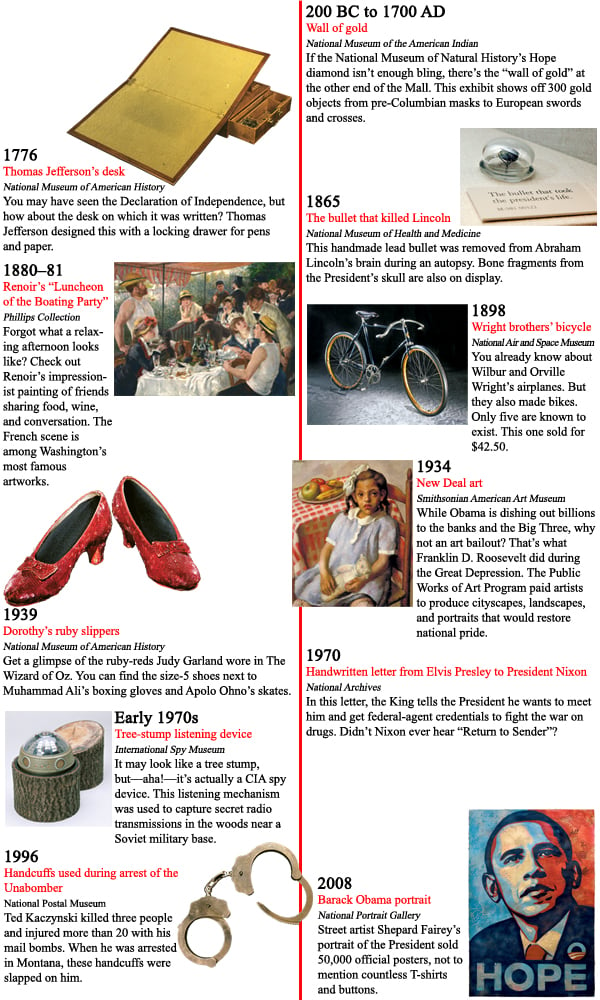 >> Next: Reason 25 to Love Living in Washington: We're inventing the future.
>> Next: Reason 25 to Love Living in Washington: We're inventing the future.
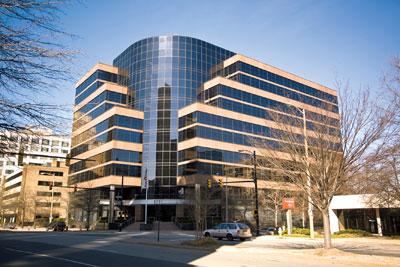
Reason 25: We’re Inventing the Future
Researchers here are developing ideas that could revolutionize the world
In science fiction, military research takes place in super-secret labs or mysterious desert locations. The Sci Fi Channel even has a TV series about a quirky town called Eureka commissioned by the President so scientists could live and work in secret. The show’s slogan: “Every small town has its secrets, but in the town of Eureka the secrets are top-secret.”
In the real world, there is no Eureka. Or rather, eureka—we’ve found it! It’s the Washington area. We just don’t often notice that the future is being created around us.
Take that office building down the street from Ballston Common mall. It may look ordinary, but it’s the headquarters of the Defense Advanced Research Projects Agency (DARPA), an agency that in the last 50 years has shaped the world we live in more than any other organization.
The agency was started in 1958 after the Soviets embarrassed the United States by launching the Sputnik satellite. President Eisenhower worried that America was losing the science arms race and established DARPA so that we’d never again be surprised by the technology of foreign powers.
DARPA’s mission is to accelerate technologies so the US military can use them in war sooner. For all the claims that big government can never innovate like the private sector, DARPA is the rebuttal. The Internet (DARPA’s name for it was the “intergalactic computer network”), e-mail, cell phones, computer graphics, weather satellites, lasers, night vision, and the Saturn V rockets that first took man to the moon all grew out of DARPA’s work. Now the agency is focusing on making the robots of science fiction come to life.
It’s also spurring the local economy in other ways. A few blocks from DARPA headquarters, there’s a popular barber shop that specializes in 1950s buzzcuts. Yet its hairdressers do offer five-minute rubs of the patron’s skull and neck afterward, and so the place is often filled with men wearing government badges who may work on robots but still long for a human touch.
Such game-changing institutions are all over Washington. A baseball’s throw from DARPA is the Office of Naval Research (ONR). The ONR traces its roots to 1907, when a naval commander noticed flaws in the design and construction of the battleship USS North Dakota, which the Navy had overlooked because it lacked its own scientists and engineers. ONR focuses on helping the Navy maintain technological superiority on, under, and above the sea. It has led the development of fiber optics, submarine-launched ballistic missiles, tilt-rotor aircraft, and deep-sea exploration. It has even made breakthroughs in the battle against tooth decay.
So the next time you’re out walking, take a second glance at that building with the nerdy-looking office workers coming out of it. It might be the home of an idea that will revolutionize your world.
—P.W. Singer
>> Next: Reason 26 to Love Living in Washington: You could meet these people at a party.
Reason 26: You Could Meet These People at a Party
From Olympians to panda curators, you never know who you’ll encounter on the social circuit.
by Erin Delmore; photographs by Matthew Worden
More than a decade after vaulting the US Women’s Olympic Gymnastics team to gold, Kerri Strug is a program manager with the Justice Department’s Office of Juvenile Justice and Delinquency Prevention.
JFK’s nephew and Maria Shriver’s brother, Tim Shriver has served for 13 years as chairman of Special Olympics, which his mother, Eunice, founded. During his tenure, the organization has recruited more than 1.8 million new athletes from around the world.
Journalist Nick Clooney is teaching at American University, and with the 2007 release of A Journey to Darfur, a documentary about genocide that he filmed with actor son George, he’s making his mark as a human-rights activist.
Shawn Armbrust, executive director of the Mid-Atlantic Innocence Project, is using DNA evidence to exonerate wrongfully convicted people in the Washington area. The national organization has helped free 235 inmates.
Breaking into the boys club of pro baseball isn’t easy. For Chartese Burnett, the Nationals’ head of communications and community relations, it’s the latest stop in a career that has also included the NBA and NFL.
As executive director of the All Dulles Area Muslim Society, Imam Mohamed Magid forges connections between that organization, the FBI, and other government agencies.
One of Washington’s most avid art collectors, Dr. Fred Ognibene of the National Institutes of Health Clinical Center keeps a collection of nearly 200 contemporary works. He has donated four to the Hirshhorn Museum and Sculpture Garden.
Lisa Stevens is the National Zoo’s curator of primates and pandas—and that includes day-to-day care of Tai Shan, the zoo’s giant-panda cub.
The career highlights of Iraqi ambassador Samir Sumaida’ie include managing a domestic security force of more than 120,000 as Iraqi Interior Minister and laying the groundwork for the Iraqi Public Broadcasting Institution.
We gathered some of the interesting people we'd want to run into at a party, and got them on video talking about what they love about Washington, what makes a good party, and more.

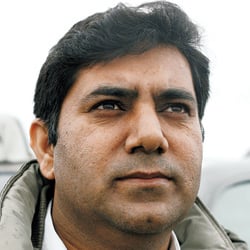 Zulfiqar Hussain
Zulfiqar Hussain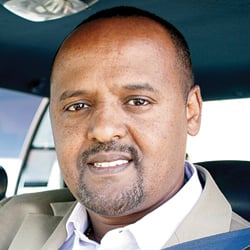 Abebe Belew
Abebe Belew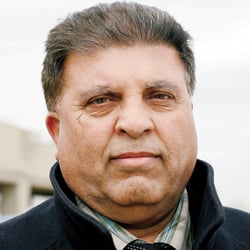 Chand I. Dohdy
Chand I. Dohdy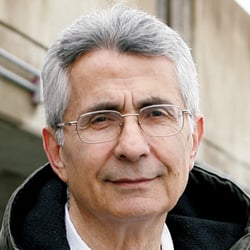 Nadim Yared
Nadim Yared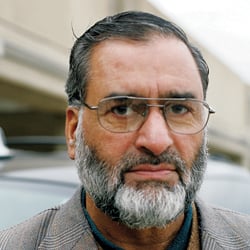 Mohammad Abbasi
Mohammad Abbasi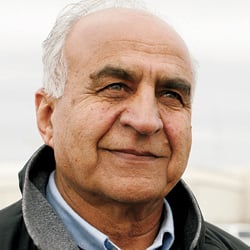 Mir Yaqub
Mir Yaqub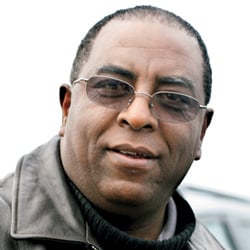 Kidus Fanta
Kidus Fanta















